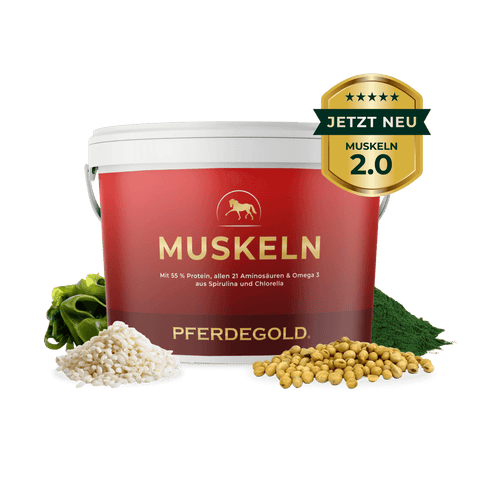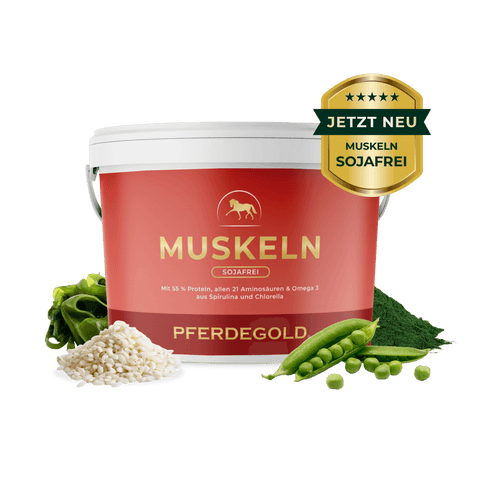
Florian ist aufgewachsen auf einem Bauernhof. Umgeben von Pferden, entdeckte er früh seine Faszination für diese majestätischen Tiere. Inspiriert von seiner reitbegeisterten Mutter, entwickelte er das Nahrungsergänzungmittel - Pferdegold. Seine tiefe Verbundenheit zur Natur und die leidenschaftliche Hingabe zu Pferden trieben ihn an, sein Unternehmen zu gründen.
Muscle building in horses: Why amino acids are essential for strong horse muscles
When you think about your horse's well-being , many things probably come to mind: sufficient exercise, a healthy diet and, of course, lots of love and care.
But have you ever thought about the importance of amino acids for your horse's muscles ?
These powerful building blocks are the key to strong muscles, optimal muscle development and impressive performance for your horse.
Whether it is a sport horse, leisure partner or broodmare – without the right supply of amino acids, no muscle can develop its full potential.
Find out here why amino acids are the foundation for powerful horse muscles and how you can specifically support your horse's muscle development.

Amino acids: The powerhouses for strong horse muscles
Amino acids are the basic building blocks of proteins and therefore the direct architects of your horse's muscles.
They are like tiny construction workers , working tirelessly to build, repair, and strengthen muscle fibers.
Every muscle, tendon, and connective tissue depends on these essential nutrients – without them, effective muscle building would simply be impossible.
⚠️ Important note: Pferdegold Muskel is not related to the symptoms described in this article. It does not treat any diseases and is not a substitute for veterinary diagnosis or treatment. This supplement can only be used as preventative support in healthy horses.

Perfect for your horse: Pferdegold® Muscles 2.0!
Our product was specially developed for targeted muscle building and to support your horse's nutrition in a natural and scientifically sound way. Made in Germany, grain-free and drug-free, with a 30-day money-back guarantee.
Try it now!The essential role of amino acids for horse muscles
+ Why are amino acids essential for muscles?
Amino acids are the direct building blocks of muscle proteins and are therefore essential for any muscle building process.
They form the framework for myosin and actin – the two main proteins responsible for muscle contraction and strength. Without an adequate supply of amino acids, your horse cannot develop optimal muscle mass despite intensive training.
+ How do amino acids support muscle building?
They promote protein synthesis in muscle cells, accelerate regeneration after training and ensure the maintenance of muscle mass .
Especially after strenuous training sessions, your horse's muscles need these building blocks to repair micro-injuries and bounce back stronger. A balanced supply of amino acids optimally supports this natural rebuilding process .
For maximum performance and visible muscle development, targeted amino acid supplementation is therefore essential .

The 21 amino acids: building blocks for perfect horse muscles
There are 21 different amino acids, all of which play an important role in the horse's body. Of these 21 amino acids, 10 are essential —meaning the horse's body cannot produce them itself and must obtain them through food.
The other 11 amino acids are non-essential , but may also need to be supplemented if there is increased need (such as during intensive training).
For optimal muscle development, horses need all 21 amino acids in balanced amounts .
For powerful muscles and impressive performance of your horse, it is essential to include these amino acids in the diet .

The 6 most important essential amino acids for muscle building
Studies show that certain essential amino acids are particularly frequently deficient in horses and simultaneously have the strongest effect on muscle growth . These 6 amino acids are crucial for optimal muscle development:
The 3 most common amino acid deficiencies in horses
Studies in horse nutrition research show that these three amino acids are most commonly lacking in horse nutrition:
-
Lysine - The Muscle Building Champion
Lysine is THE amino acid for muscle building and plays a central role in the development of powerful muscles.
It plays a key role in the formation of muscle proteins and promotes muscle growth . Collagen, the most important structural protein for tendons and ligaments , also depends on lysine. Lysine also supports calcium absorption, which is crucial for strong bones, the foundation of muscle .
-
Methionine - Strength for muscles and musculoskeletal system
Methionine is not only a source of sulfur, but also a key building block for strong muscles and a functioning muscle metabolism.
It is particularly important for the synthesis of muscle proteins and contributes to the development of strong, resilient muscles . Methionine also supports the formation of keratin for strong hooves—the foundation for powerful movement. This amino acid should be present in sufficient quantities in the diet to ensure optimal muscle development.
-
Threonine - For elastic, powerful muscles
After lysine, threonine is the second most important muscle-building amino acid and is essential for tendons, ligaments and the entire musculature .
Threonine supports the formation of collagen and elastin—the proteins that ensure supple, elastic, and powerful muscles. It contributes to resilient connective tissue, which forms the basis for powerful movement.
Threonine also strengthens the intestinal mucosa and thus ensures optimal nutrient absorption – the basis for effective muscle building.

The 3 most powerful muscle-building amino acids
According to scientific studies, these three amino acids show the strongest direct effect on muscle building and muscle protein synthesis:
-
Isoleucine - The energy booster for muscles
Isoleucine is a branched-chain amino acid (BCAA) that is metabolized directly in the muscles and serves as an energy source for intensive muscle work .
Studies from the University of Veterinary Medicine, Vienna, show that isoleucine can increase muscle protein synthesis by up to 35% . It promotes glucose uptake into muscle cells and supports recovery after intense exercise. Adequate isoleucine intake is crucial for optimal performance, especially in sport horses.
-
Valine - The muscle protection expert
Valine, also a BCAA, protects the muscles from breakdown (catabolism) and at the same time promotes targeted muscle building.
Research from the Institute of Animal Nutrition shows that valine improves muscle nitrogen balance by 28% . It regulates blood sugar levels and ensures a consistent energy supply to the muscles. Valine is particularly important during longer training sessions and supports endurance performance.
-
Glutamine - The regeneration specialist
Glutamine is the most abundant free amino acid in muscle tissue and plays a key role in muscle regeneration and the immune system .
Studies by the Equine Research Foundation show that glutamine can reduce recovery time after intense exercise by up to 40% . It supports protein synthesis, strengthens the intestinal barrier for better nutrient absorption, and reduces muscle damage caused by oxidative stress.

Why a high protein content is crucial:
A high protein content in amino acid supplements is not only desirable, but absolutely necessary to achieve the ideal daily amount of amino acids.
Why high protein content is important:
Concentration for effectiveness: To achieve the scientifically recommended daily amounts of essential amino acids, the concentration in the supplement must be high enough. Lower protein levels would require feeding impractically large amounts.
Bioavailability: Highly concentrated amino acid profiles are absorbed and utilized more efficiently by the horse's body than diluted mixtures with many fillers.
Don't worry about "too much" protein
Many horse owners have concerns about excessive protein content – however, these concerns are unfounded given the recommended dosage of amino acid supplements:
Small feeding amounts:
Since only small, concentrated amounts of supplementary feed (usually 50-100g daily) are fed, the actual protein intake is far below problematic amounts.
Basic feeding is crucial:
Too little or too much protein is primarily controlled by the basic diet (hay, grass, concentrates). Horse owners should pay particular attention here and ensure that the basic diet is balanced —neither low in protein nor overloaded with protein.
Deficiency vs. ideal supply:
There's a crucial difference between an amino acid deficiency and an ideal nutrient supply . Most horses are deficient due to incomplete basic nutrition – supplementation leads them to optimal nutrient supply, not excess nutrient supply.
Demand-based utilization:
The horse's body uses amino acids according to its needs. Excess amino acids are not simply "stored" but metabolized or excreted . It's important to ensure the horse consumes sufficient fluids . A good supply of water supports protein metabolism and prevents strain on the kidneys.

Transport and bioavailability: Why pure proteins are not enough
Amino acids can only develop their full effect when they are optimally transported and utilized. Therefore, protein intake alone is not enough – the right combination with accompanying substances is crucial.
Important accompanying substances for optimal amino acid utilization:
Omega-3 fatty acids: Support the transport of amino acids across cell membranes and improve bioavailability by up to 30%. They also have anti-inflammatory effects and promote regeneration.
Antioxidants (vitamin E, selenium): Protect amino acids from oxidative damage during transport and metabolism. They are especially important during intense muscle activity, as this increases the production of free radicals.
B vitamins: Act as cofactors in amino acid metabolism. Without sufficient B vitamins, even optimally dosed amino acids cannot be fully utilized.
Minerals (zinc, magnesium): Essential for protein synthesis and muscle contraction. Zinc deficiency can reduce amino acid utilization by up to 40%.
Utilize synergy effects
High-quality supplemental feeds take these synergistic effects into account and contain not only amino acids but also the necessary accompanying substances for optimal utilization. Only in this way can the full potential of amino acids for muscle building be exploited.

Signs of amino acid deficiency: When the muscles suffer
An amino acid deficiency is particularly evident in the muscles of horses and can significantly impair performance.
The most common signs include:
-
Weak muscle development: Despite regular training and sufficient exercise, your horse does not develop visible, strong muscles.
-
Muscle atrophy: The existing muscles are wasting away, especially in the croup and neck area.
-
Prolonged regeneration: After training, the horse needs an unusually long time to recover.
-
Decrease in performance: The horse tires more quickly and shows less strength when working.
-
Stiff movements: The muscles feel tense and movements seem inelastic.
-
Susceptibility to muscle tension: Common problems with stiff or sore muscles.
In cases of muscular problems, targeted amino acid supplementation is often the first step towards improvement.
If problems persist, we recommend consulting a veterinarian to optimally support your horse's well-being and muscle health.

Proper muscle nutrition: How horses use amino acids to build muscle
For powerful muscle growth, horses require a targeted supply of amino acids. Proteins are crucial here, as they serve as direct building blocks for the muscles.
But how exactly do horses use these proteins?
In the digestive tract, proteins are broken down into their individual amino acids. These are then transported via the bloodstream directly to the muscle cells, where they are used for muscle building, repair, and maintenance.
What makes a high-quality muscle supplement?
Modern supplements for muscle building are characterized by various quality features. A complete amino acid spectrum with all 21 amino acids is particularly important, as many products on the market contain only a fraction of the necessary amino acids.
Important quality criteria:
- High protein content for maximum effectiveness
- Complete amino acid spectrum with 21 amino acids
- Doping-free composition for sport and competition horses
- Scientifically sound dosage based on current studies
Such a comprehensive muscle supplement ensures that your horse receives all the necessary building blocks to strengthen its muscles, repair muscle fibers, and support impressive muscle development.

Pferdegold® Muscles 2.0!
Our Muscles 2.0 was developed with nutrition experts and veterinarians specifically for targeted muscle building and contains all 21 amino acids in scientifically proven dosages. Available in two versions: classic and soy-free for sensitive horses.
Try it now!Conclusion
Amino acids are the foundation for powerful horse muscles and the key to optimal muscle building.
They form the basis for strong muscles , effective regeneration, and impressive performance. With the targeted supply of amino acids, you optimally support your horse's natural muscle development.
Always remember: Strong muscles are the foundation for a healthy, efficient, and happy horse. Let's work together to ensure your four-legged friend reaches his muscular peak.

FAQ
How do essential and non-essential amino acids differ?
Essential amino acids are those muscle-building building blocks that the horse's body cannot produce itself and therefore must be obtained through food. Non-essential amino acids can be produced by the body itself. However, for optimal muscle building, all 21 amino acids are important—both essential and non-essential.
High-quality supplements contain all 21 amino acids, while other products often offer only a few essential amino acids. This completeness makes the crucial difference for powerful muscle building.
How do seasons and grazing conditions influence the amino acid content of feed?
The quality and amino acid content of pasture grass can vary greatly depending on the season and soil conditions. In some seasons or under poor pasture conditions, the content of muscle-building amino acids in the grass is significantly reduced.
Therefore, year-round supplementation with high-quality amino acid supplements is particularly important to consistently support muscle development and compensate for seasonal fluctuations.
What role do amino acids play in the rehabilitation of injured horses?
Amino acids play a key role in the repair and regeneration of muscle tissue. In injured horses, they can help accelerate the muscle healing process and rebuild lost muscle mass. A targeted supply of amino acids with complete supplements can optimally support the rehabilitation process and help the horse return to full muscle strength and performance more quickly.
IMPORTANT:
Pferdegold is not a substitute for veterinary diagnosis or treatment . The information contained in this article is for general informational purposes only and is intended to help improve your horse's well-being.
Pferdegold products do not treat or cure diseases , but rather support your horse in correcting nutritional deficiencies through targeted nutrient intake. However, they are not a substitute for professional advice from a veterinarian or specialist.
If your horse has any health problems , we strongly recommend consulting a veterinarian . Pferdegold assumes no liability for decisions made based on the information provided here.

















